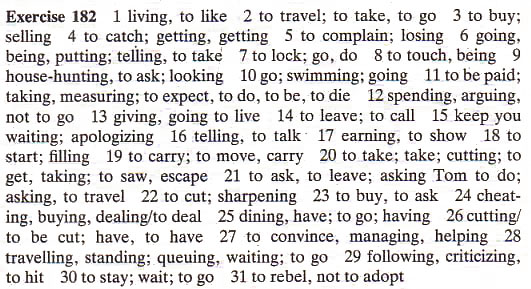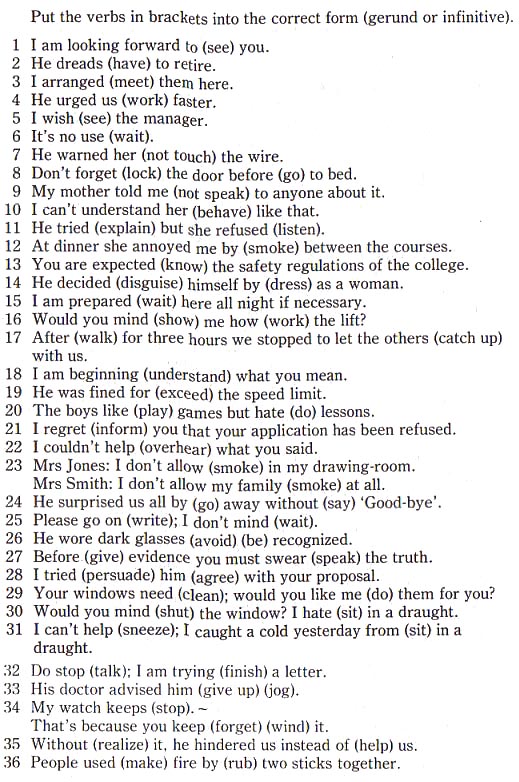
GERUND OR INFINITIVE?
Usually this has no effect on the meaning, but with some
verbs there is a clear difference in meaning. Verbs marked * can also
be followed by a that-clause.
Example: to prefer
I prefer to live in an apartment.
I prefer living in an apartment.
A. Verbs where there is little or no difference
in meaning:
allow
attempt
begin
bother
cease
continue deserve
fear*
hate*
intend*
like
love neglect
omit
permit
prefer*
recommend*
start
Notes:
1. Allow is used in these two patterns:
a. Allow + object + to-infinitive:
Her parents allowed her to go to the party.
b. Allow + gerund:
Her parents don't allow smoking in the house.
2. Deserve + gerund is not very common, but
is mainly used with passive constructions or where there is a passive meaning:
a. Your proposals deserve being considered in detail.
b. These ideas deserve discussing. (= to be discussed).
3. The verbs hate, love, like, prefer are usually
followed by a gerund when the meaning is general, and by a to-infinitive when
they refer to a particular time or situation. You must always use the
to-infinitive with the expressions 'would love to', 'would hate to', etc.
Compare:
- I hate to tell you, but Uncle Jim is coming this weekend.
- I hate looking after elderly relatives!
- I love dancing.
- I would love to dance with you.
B. Verbs where there is a clear difference in meaning:
Verbs marked with an asterisk* can also be followed by a that-clause.
come
forget*
go on mean*
regret*
remember* stop
try
NOTES:
Come:
Come + gerund is like other verbs of movement followed by the
gerund, and means that the subject is doing something as they move:
- She came running across the field.
Come + to-infinitive means that something happens
or develops, perhaps outside the subject's control:
- At first I thought he was crazy, but I've come to appreciate his sense of
humour.
- How did you come to be outside the wrong house?
- This word has come to mean something quite different.
Forget, regret and remember:
When these verbs are followed by a gerund, the gerund refers
to an action that happened earlier:
- I remember locking the door (= I remember now, I locked the door earlier)
- He regretted speaking so rudely. (= he regretted at some time in the past,
he had spoken rudely at some earlier time in the past.)
Forget is frequently used with 'never' in the
simple future form:
- I'll never forget meeting the Queen.
When these verbs are followed by a to-infinitive,
the infinitive refers to an action happening at the same time, or later:
- I remembered to lock the door (= I thought about it, then I did it.)
- Don't forget to buy some eggs! (= Please think about it and then do it.)
- We regret to announce the late arrival of the 12.45 from Paddington. (= We
feel sorry before we tell you this bad news.)
Go on:
Go on + gerund means to continue with an action:
- He went on speaking for two hours.
- I can't go on working like this - I'm exhausted.
Go on + to-infinitive means to do the next action, which is
often the next stage in a process:
- After introducing her proposal, she went on to explain the benefits for the
company.
- John Smith worked in local government for five years, then went on to become
a Member of Parliament.
Mean:
Mean + gerund expresses what the result of an action will be,
or what will be necessary:
- If you take that job in London it will mean travelling for two hours every
day.
- We could take the ferry to France, but that will mean spending a night in
a hotel.
Mean + to-infinitive expresses an intention
or a plan:
- Did you mean to dial this number?
- I mean to finish this job by the end of the week!
- Sorry - I didn't mean to hurt you.
Stop:
Stop + gerund means to finish an action in progress:
- I stopped working for them because the wages were so low.
- Stop tickling me!
Stop + to-infinitive means to interrupt an activity in order
to do something else, so the infinitive is used to express a purpose:
- I stopped to have lunch. (= I was working, or travelling, and I interrupted
what I was doing in order to eat.)
- It's difficult to concentrate on what you are doing if you have to stop to
answer the phone every five minutes.
Try:
Try + gerund means to experiment with an action that might
be a solution to your problem.
- If you have problems sleeping, you could try doing some yoga before you go
to bed, or you could try drinking some warm milk.
- 'I can't get in touch with Carl.' 'Have you tried e-mailing him?'
Try + to-infinitive means to make an effort
to do something. It may be something very difficult or even impossible:
- The surgeons tried to save his life but he died on the operating table.
- We'll try to phone at 6 o'clock, but it might be hard to find a public telephone.
- Elephants and mice have to try to live together in harmony.
Exercises

Keys
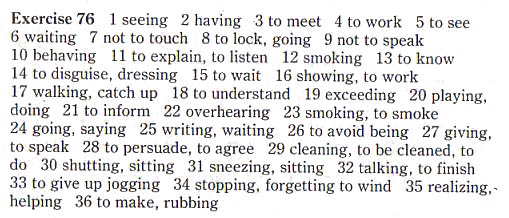
§§§§
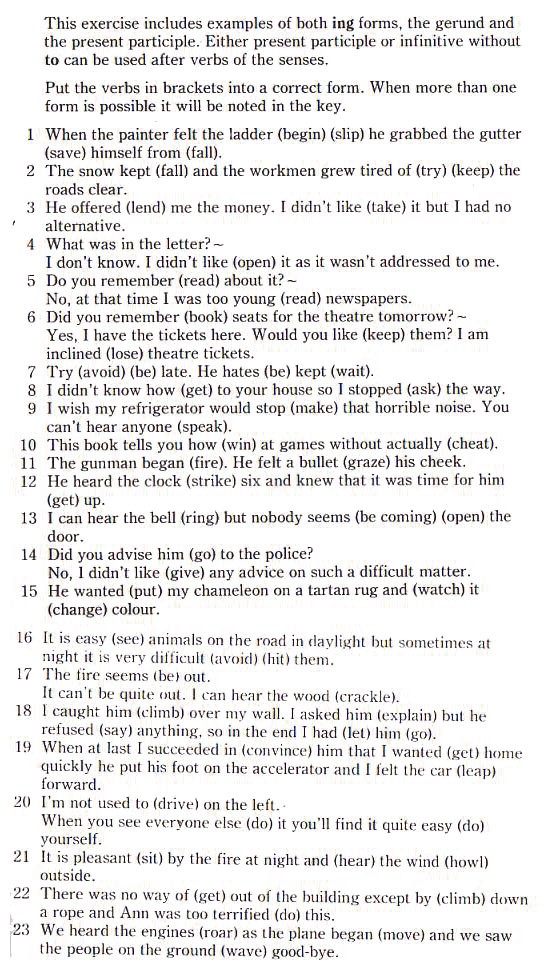
Keys
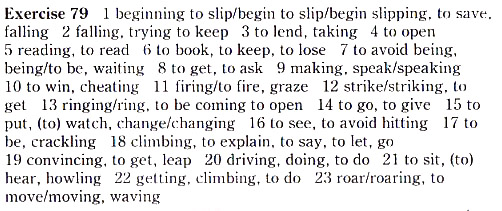
§§§§
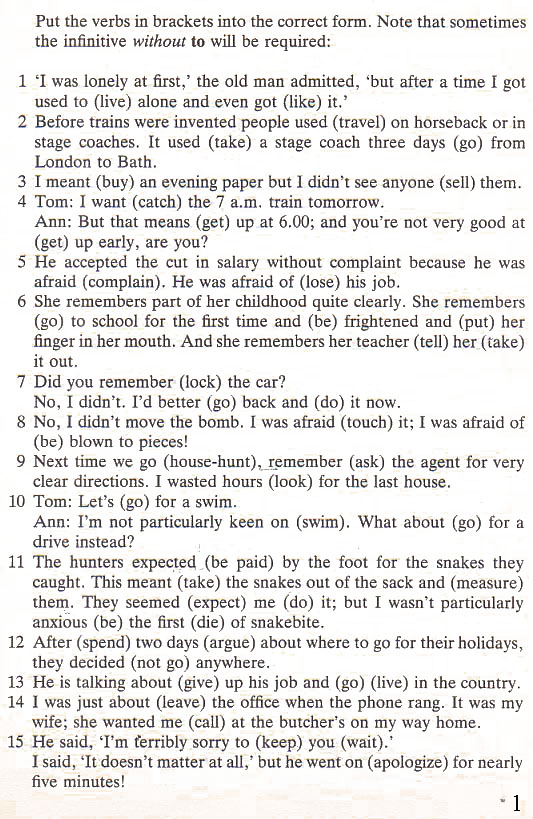
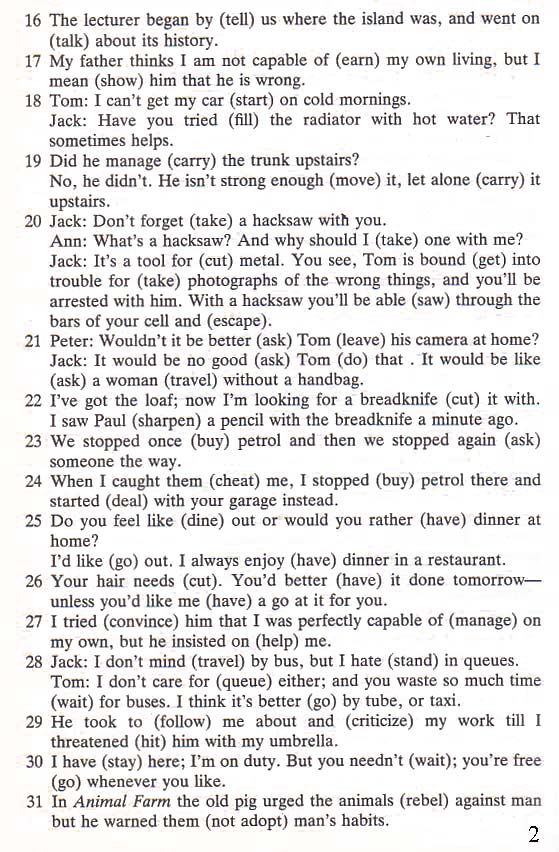
Keys
